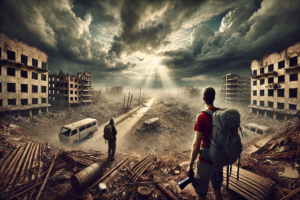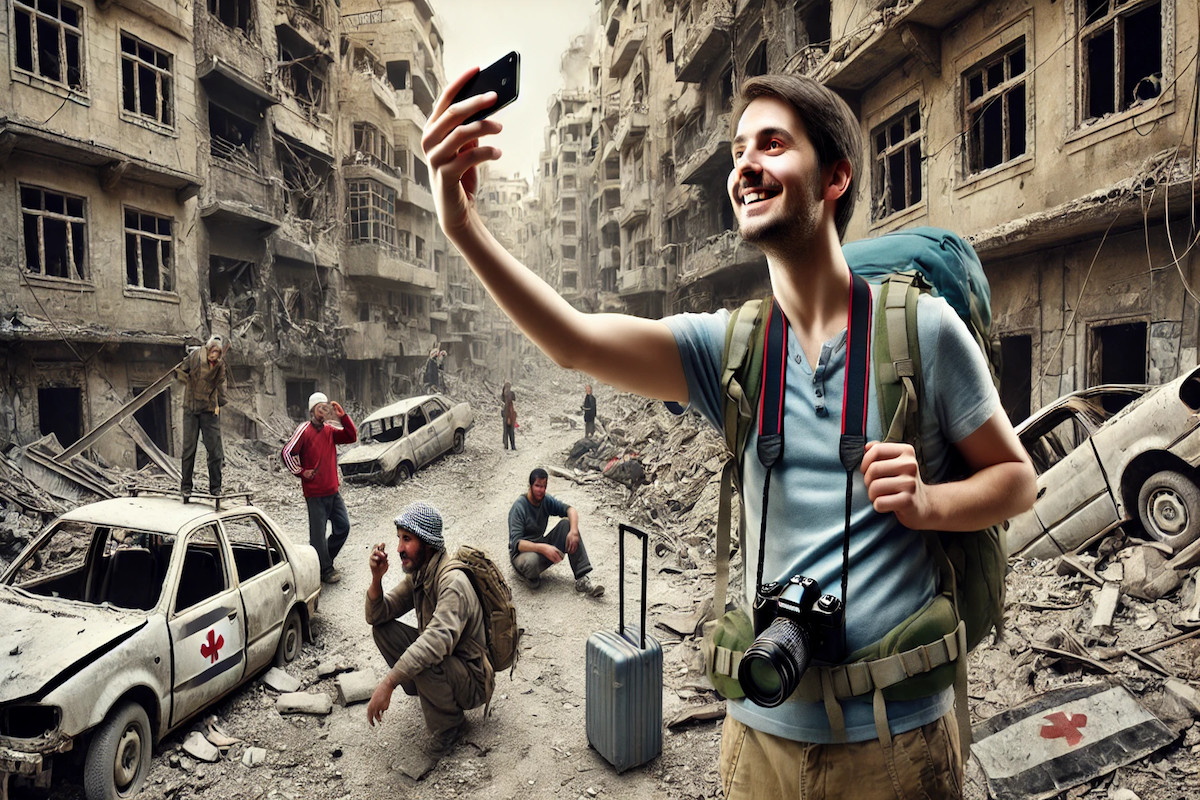Contents
- Why Conflict Zone Tourism Isn’t the Adventure You Think It Is
- 1. A Front-Row Seat to Turmoil
- 2. The Allure of “Dangerous Destinations”
- 3. The Hidden Costs of War-Zone Tourism
- 4. Lessons from My Time in Conflict Zones
- 5. How to Support Conflict Zones Without Stepping Into Harm’s Way
- 6. The Emotional and Ethical Cost of Being a Witness
- 7. Why Conflict Zones Aren’t the Adventure You’re Seeking
- The Truth About Conflict Zone Travel: It’s Time to Rethink the Journey
Why Conflict Zone Tourism Isn’t the Adventure You Think It Is
War-zone travel is not the adventure influencers portray, it’s fraught with risks and hard lessons.
Here’s my personal journey and what I wish others would know before they go.
1. A Front-Row Seat to Turmoil
Imagine walking through a city where tension hums in the air and every face carries the weight of survival.
When I first set foot in Ukraine in 1998, I had gone with a French humanitarian group I had joined back in France with the best intentions.
But it soon became clear that the “president” of this “association” might have had ulterior motives. But that’s a story for another time…
Despite the complications, the trip changed my life: I fell in love and eventually returned to Ukraine to be with her a year later, gaining a crash course in navigating a nation grappling with its post-Soviet identity.
My journey through Ukraine spanned decades and revolutions, from the Orange Revolution in 2004 to the Euromaidan protests in 2014.
Along the way, I lived in cities like Donetsk and Kyiv, each with its own story of resilience and turmoil.
What I learned about conflict zones wasn’t from YouTube videos or social media, it came from being there, watching history unfold, and realizing how little my presence truly mattered in the grand scheme of things.
In this article, I’ll share the harsh truths of traveling to conflict zones, the ethical dilemmas I faced, and the lessons I’ve learned about supporting these regions without becoming a burden on them.

2. The Allure of “Dangerous Destinations”
For some travelers, the appeal of conflict zones lies in their raw, unfiltered reality.
These places offer a raw glimpse of history, untouched by commercial tourism.
I didn’t go to Ukraine seeking adventure, I went on what I thought was a humanitarian mission, but I came to understand the allure these types of places hold for others.
When I moved to Donetsk in 2004, I thought I was stepping into a world of rough and raw cultural exchange.
Instead, I within a few months, found myself navigating a city simmering with pro-Russian sentiment while Kyiv erupted in protests that were pro-western.
Walking through Donetsk felt like threading a needle through a political storm I couldn’t control or fully understand.
My American identity wasn’t a shield, it was a vulnerability. It often made me feel like an uninvited observer in someone else’s deeply personal fight for what they believed in.
Later, during the Euromaidan protests in 2014, I witnessed another kind of tension in Kyiv.
The square was alive with hope and defiance, yet there were corners I avoided, makeshift quarters of extremist groups whose icy glares reminded me that not all Westerners were welcomed with open arms.
3. The Hidden Costs of War-Zone Tourism
My time in Ukraine taught me that visiting conflict zones, even unplanned ones, isn’t just about witnessing history, it’s about grappling with the unintended consequences of your presence.
During the Euromaidan protests, I saw tourists and expats treating Maidan square like a spectacle.
They snapped selfies against barricades, ignoring the gravity of the sacrifices being made around them.
It was a sobering reminder that even well-meaning expats and travelers can inadvertently exploit the very struggles they seek to understand.
In moments like these, I couldn’t help but wonder: Were these people doing more harm than good?
By being there, were they amplifying their own story or merely consuming it for their own benefit?
These questions became impossible to ignore, shaping my thoughts about travel in conflict zones from that point forward.
4. Lessons from My Time in Conflict Zones
Traveling, or living in a conflict zone is not for the faint of heart. It’s definitely not a smart move if you can avoid it.
Here’s what my experiences taught me about navigating these complex environments:
1. Stay Neutral, Stay Respectful
As a foreigner, I always saw myself as a guest. During the Euro-Maidan Uprising, I avoided joining protests (unlike many foreigners there at the time) or engaging in political discussions, especially with locals. It wasn’t my battle to fight, and my presence didn’t entitle me to a voice in their struggle either.
2. Understand the Stakes
Before you step foot in a conflict zone, you need to do your homework. The revolutions I witnessed weren’t just political, they were deeply personal struggles for the people living through them. If you don’t understand the context, you risk trivializing their pain.
3. Don’t Be a Burden
During the 2022 invasion of Ukraine, I considered returning to help. But I realized I lacked the skills to contribute meaningfully. Without expertise in medical aid, logistics or military skills, I’d have been another mouth to feed. Another liability in an already strained system.
4. Avoid Voyeurism
War tourism, where travelers flock to conflict zones for the thrill of danger, disrespects the gravity of the situation. The lives at stake are not entertainment, and treating them as such diminishes the humanity of those involved.

5. How to Support Conflict Zones Without Stepping Into Harm’s Way
After decades of navigating conflict zones and reflecting on my experiences, I’ve come to believe that the best way to help often doesn’t involve being there.
Here are practical steps you can take to make a real difference:
1. Donate Smartly
Your money matters when it’s directed to trusted NGOs and local groups providing essentials like medical care, food, and housing. Research transparency and make sure your donation empowers the people who need it most.
2. Buy Local
Support artisans and businesses in conflict zones by shopping directly through online marketplaces or fair-trade partners. Your purchases help people rebuild their lives.
3. Amplify Stories Responsibly
Use your platform to highlight the realities of conflict, but focus on local voices and verified facts. Skip the self-centered posts and avoid sensationalism.
4. Help Refugees at Home
Refugees need support wherever they land. Offer your time through mentorship, language lessons, or donation drives in your community.
5. Push for Policy Change
Advocate for peace and humanitarian efforts. Write to your representatives, support campaigns for refugee rights, and join global movements for justice.
6. Get Educated
Don’t act without understanding. Read up on the history, follow local journalists, and listen to those directly affected. Informed action is powerful action.
Sometimes, the most impactful thing you can do is stay out of the way while supporting from a distance.
6. The Emotional and Ethical Cost of Being a Witness
One of the hardest lessons I’ve learned is that not every story needs your participation.
There’s a fine line between bearing witness to history and intruding on someone else’s struggle.
During my time in Ukraine, I often felt like I was walking that line. At its best, my presence offered solidarity with the people I lived among.
At its worst, I questioned whether I was contributing anything meaningful, or simply observing their pain from the sidelines.
When war broke out in 2022, I knew I had to make a choice: to return or to help from afar.
I chose the latter, recognizing that my skills and resources could make a bigger difference when directed thoughtfully.
It wasn’t the heroic story I’d once imagined, but it was the right decision for me, and for those I wanted to support.

7. Why Conflict Zones Aren’t the Adventure You’re Seeking
For those tempted by the allure of conflict zones, let me offer this: the risks and consequences far outweigh the thrill.
Beyond the personal dangers: injury, arrest, or worse, there’s the emotional toll of witnessing trauma firsthand.
More importantly, conflict zones aren’t a stage for your personal narrative. If you need to reinvent yourself, or become more interesting, conflict zones aren’t the places to do that.
The lives at stake, the struggles unfolding, and the histories being written are deeply personal to the people living them.
Your role as a traveler isn’t to be part of the story, it’s to respect it from a distance and support it in meaningful, unobtrusive ways.
The Truth About Conflict Zone Travel: It’s Time to Rethink the Journey
Traveling to conflict zones is a decision that demands reflection, humility, and caution.
While the idea of being a witness to history might feel noble, the reality is often fraught with ethical dilemmas and unintended consequences.
Instead of chasing danger, focus on how you can uplift and empower those living through conflict.
Whether it’s through donations, advocacy, or thoughtful consumption, you can make a lasting impact without stepping into harm’s way.
Is there’s ever a right way to visit a conflict zone?

David Peluchette is a Premium Ghostwriter/Travel and Tech Enthusiast. When David isn’t writing he enjoys traveling, learning new languages, fitness, hiking and going on long walks (did the 550 mile Camino de Santiago, not once but twice!), cooking, eating, reading and building niche websites with WordPress.

